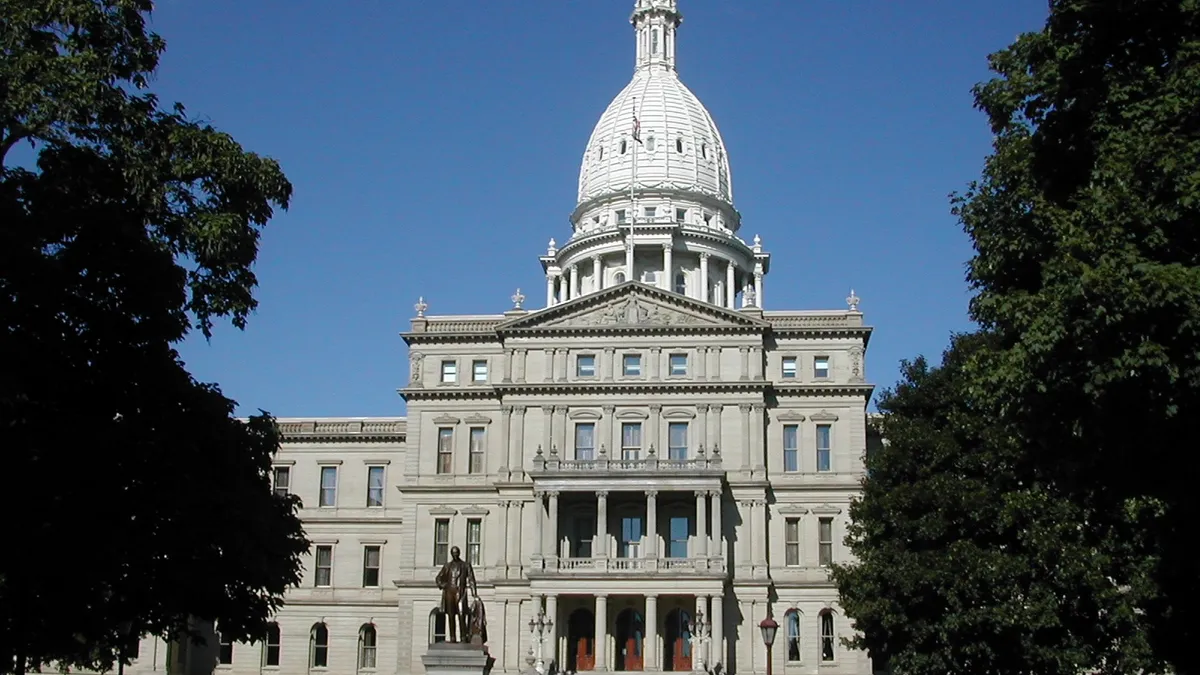Dive Brief:
- A controversial bill to amend utility planning processes, increase the renewables mandate and tighten rules on alternative energy suppliers in Michigan could be heading for a vote after the November election following support from the Chamber of Commerce this week, the Detroit News reports.
- The Chamber, influential with conservative lawmakers in the state, endorsed SB 437 this week, saying it would help ensure electric reliability while preserving the energy choice program open to 10% of the state's customers.
- Energy choice advocates, however, claim the new rules would kill the choice program and published a new poll this week they say shows a majority of Michiganders opposed to the legislation.
Dive Insight:
As Michigan's utilities retire their aging coal generation, the state faces looming generation shortfalls as soon as 2018. At the same time, renewable energy debates have divided the legislature in recent years, and the state's utilities have already met the existing 10% target.
SB 437 aims to address reliability issues by amending the utility IRP process and putting new rules on alternative electric suppliers. These non-utility suppliers, capped at serving 10% of customers, would have to prove their electricity supplies two years in advance.
Supporters call it a common-sense rule, but energy choice advocates say the provision will cripple the alternative suppliers, allowing utilities to capture the remaining market share. They argue the reliability concern is a red herring, since Michigan is a part of regional grid MISO, and the grid operator and Gov. Rick Snyder (R) announced new advanced planning procedures last month aimed avoiding generation shortfalls.
The Chamber, however, said it was confident the measure would not scuttle the choice program, in part because the bill "keeps in place the grandfather clause that ensures customers who have been on choice prior to the 2008 law remain able to stay on electric choice and expand their electric use, despite the 10% cap."
The bill would also allow alternative suppliers to submit competing proposals to utility-owned projects at the Public Service Commission, the Chamber noted, "to ensure that a project cannot be approved by the Public Service Commission unless it meets the most reasonable and prudent standard."
The legislation was recently amended to include an increase to a 15% renewable energy mandate, the Detroit News reports, in a bid to win Democratic votes. It would also establish a voluntary goal of meeting the state's power needs with 35% renewables and efficiency by 2030, as well as put in place new efficiency programs above the current 1% mandate. Utilities would also be pushed to enhance demand response programs.
Regardless of the outcome of the November election, the Chamber's CEO urged lawmakers to move on the bill in the lame duck session. The business group, the News notes, holds significant sway with state legislators, and its support could help ease opposition from some business customers who were critical of the choice provisions.
How Michigan voters would respond remains unclear. Energy Choice Now, a bill opponent, released results of a poll of 600 residents this week, finding that voters oppose the proposal "to add additional restrictions on competition within the electric market in Michigan" by a 62-20 margin. The poll, which has not been published online, did not address other elements of SB 437.













